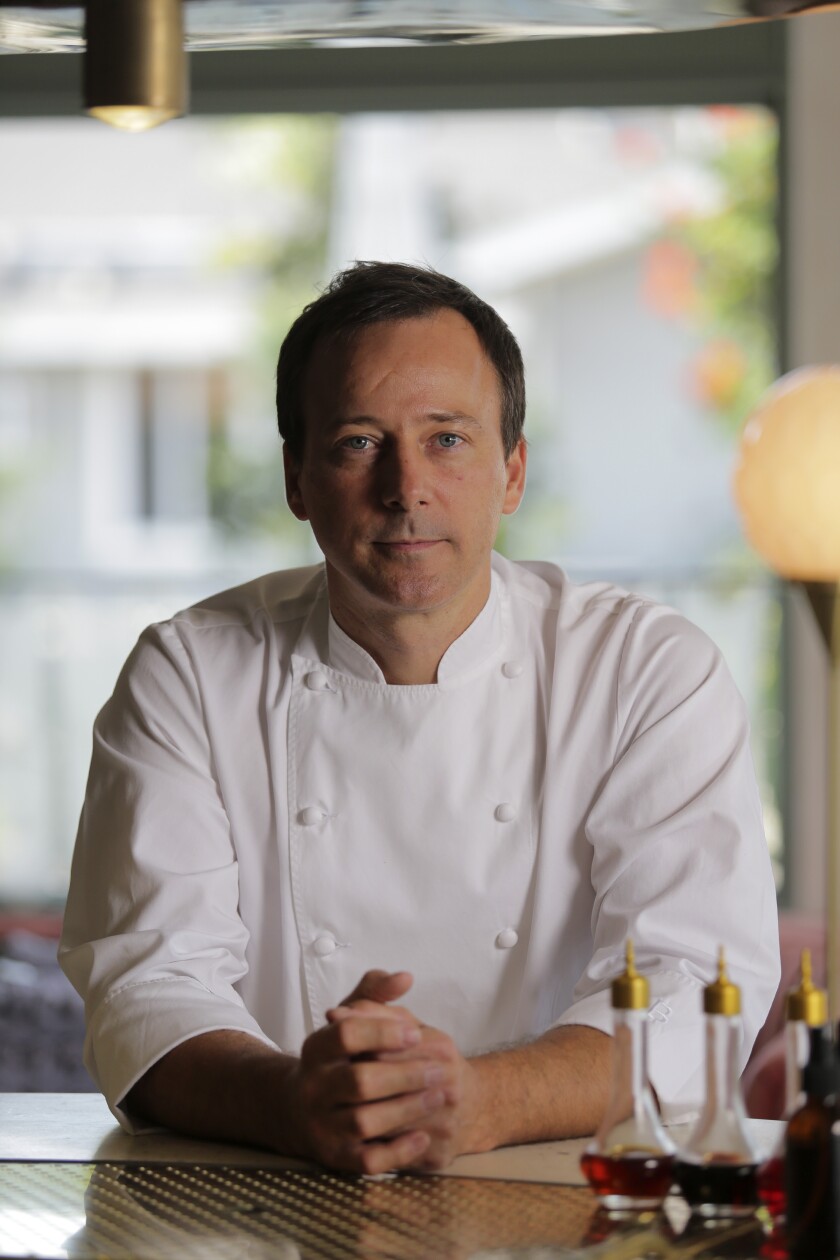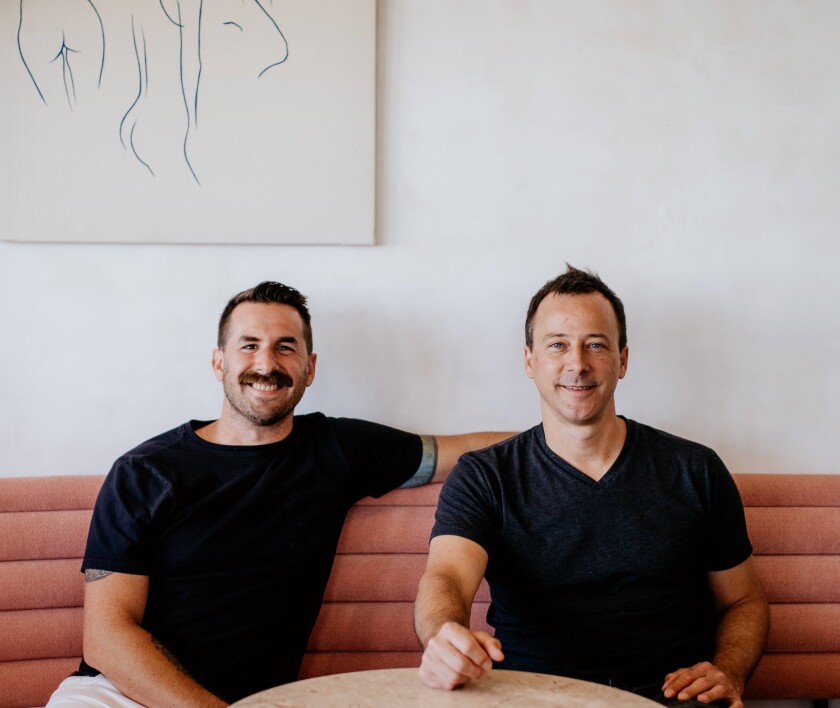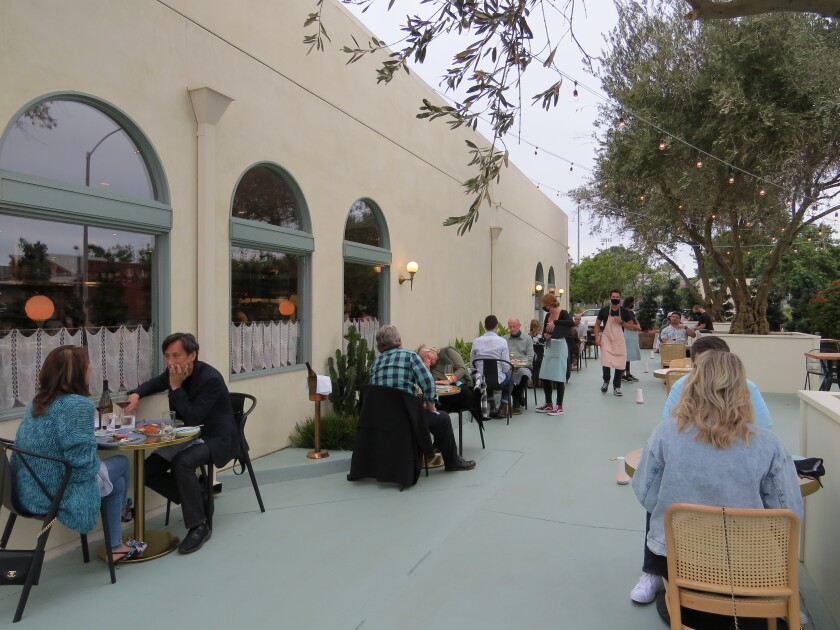By PAM KRAGEN
Last week, Eric Bost arrived in the kitchen as the new executive chef at Carlsbad’s French Nouvelle restaurant Jeune et Jolie.
To get an idea of how big a deal this could be for San Diego’s culinary future, you need only look at his Instagram page to see some of the Michelin-starred chefs who stopped in for a meal last year at Bost’s now-shuttered L.A. restaurant, Auburn: Rene Redzepi, founder of four-time “World’s Best Restaurant” winner Noma in Copenhagen; Grant Achatz, whose Alinea in Chicago is a world leader in the molecular/progressive food movement; and Bost’s former employer Guy Savoy, whose eponymous Parisian restaurant is one of just over 100 places in the world right now with three Michelin stars.
And if that’s not convincing enough, ask acclaimed chef Travis Swikard, who left famed Manhattan’s Boulud Sud in 2018 to return to his native San Diego to open Callie, a Mediterranean-inspired restaurant that will soon debut in East Village.
“San Diego is lucky to have Eric,” Swikard said last weekend. “It’s cool to see that kind of talent coming here. It’s about having a mature chef who understands the importance of leadership and teamwork and what his legacy means for San Diego and what it will mean for the next 10, 15, and 20 years.”
The San Francisco Bay area has been a major dining destination for decades, thanks to pioneering legends like Alice Waters and Thomas Keller. And Los Angeles’ cuisine burst into national prominence over the past decade thanks to chefs like Ludo Lefebvre, Roy Choi, Nobu Matsuhisa and Nancy Silverton. But San Diego has yet to arrive as a major restaurant city.
That could soon change.
Michelin Guide issued its first all-California guide last year and its inspectors awarded San Diego’s first-ever star to chef William Bradley’s Addison in Carmel Valley, as well as Bib Gourmands, something akin to a “hidden gem” honor, to eight other local spots, including Jeune et Jolie’s more casual sister eatery in Carlsbad, Campfire. Jeune et Jolie missed out on a Michelin honor last year, perhaps because it opened only a few months before inspectors made their rounds in early 2019. But it was named 2019 Restaurant of the Year by The San Diego Union-Tribune and Eater San Diego and was one of 22 spots named to Esquire Magazine’s Best New Restaurants in America list for 2019.
Looking ahead, Bost and Jeune et Jolie owner John Resnick are eager to add a Michelin star to the nearly 2-year-old restaurant’s accolades.
“Michelin’s transition to California is huge in bringing awareness to cities outside of San Francisco,” Bost, 46, said. “To have that in L.A. has been hugely important. It certainly drives business into a restaurant. Having Michelin here is an affirmation that quality can be found in smaller cities.”
Bost and his business partner were forced to close their much-heralded Auburn on May 1 due to uncertainties related to the pandemic. Judging by the heap of honors Auburn racked up in its 12 months of full service, it was likely poised for Michelin acknowledgment this year. But the restaurant ratings organization has postponed the release of its 2020 guides due to the massive turmoil and turnover in the industry.
A few months after Auburn closed, Jeune et Jolie’s founding chef Andrew Bachelier stepped down to find a cooking job with more family-friendly hours. Resnick reached out to Bost, and over a series of long conversations, they mapped out a plan for the future.
This isn’t just a placeholder gig until Bost can find another job in L.A. This is a lifestyle change. Bost lived in San Diego many years ago, and he and his wife love the idea of raising their 8-year-old son, Ethan, in the less-urban beach community of Cardiff, where they can grow vegetables in their backyard and Bost has quick access to some of the finest fresh seafood purveyors and produce farms in the nation.
“Every time Ellie and I could get away from L.A., we’d always come down here to Moonlight Beach, which is a favorite, or we’d drive down to Cardiff,” Bost said. “Many of the lots where we’re renting a house in Cardiff are zoned for agriculture, so it allows us to get close to the land.”

Born into the business
Bost grew up in Raleigh, N.C., where his grandparents owned several restaurants. By age 12, hanging out in the bustling eateries was a favorite pastime: “I loved the energy and the drive of the places.”
Thinking he’d run his own restaurant someday, Bost earned a business degree in hospitality management from the University of North Carolina at Wilmington. But in his junior year there, Bost realized he wanted to explore becoming a chef. After attending the Culinary Institute of America in Napa, he did an externship at the now-closed Le Cirque restaurant in New York. Then he spent a few years cooking at the Ritz-Carlton Hotel in St. Thomas, where he met his French-born future wife, Elodie.

To kick his career into higher gear, Bost moved to France in 2001 and — armed with some conversational French — he cold-called most of the 3-star Michelin chefs in Paris to get a foot in the door. His strategy worked. Over the course of three years in Paris, he staged (interned) at Alain Ducasse au Plaza Athénée, was sous chef de cuisine at Pierre and chef de partie at Hotel de Crillon, Les Ambassadeurs.
In 2004, Bost moved back to the U.S. with his new wife and settled in San Diego, where he spent a year at the Lodge at Torrey Pines and a year at the Inn at Rancho Santa Fe. His next big break came in 2006, when Savoy hired Bost for the opening team at Restaurant Guy Savoy at Caesar’s Palace in Las Vegas. In his three years there, Bost rose to executive chef, then he transferred to Savoy’s restaurant in Singapore, where he would serve as both executive chef and general manager. After that, the Bosts spent some time in Champagne, France, where he had hoped to open a restaurant, but couldn’t find the right opportunity. Then it was back to California in 2015 for a year as executive chef at République in L.A. Finally, after 20 years cooking for and managing other chefs’ restaurants, Bost was ready to start his own.
The Auburn years
Beginning in 2017, Bost poured his heart and soul into planning, building and opening the Melrose Avenue restaurant Auburn, a sunny, unfussy modernist space that served four-, six- and nine-course tasting menus priced from $75 to $150. Within months of Auburn’s opening on March 15, 2019, rave reviews poured in praising Bost’s flavor-packed and eye-popping dishes, the restaurant’s zenlike atmosphere and its warm, unpretentious service.
“The idea was to deformalize high-end dining to deliver a sense of comfort,” Bost said. “It felt like home to people.”

But the tasting menu concept was hard to sustain. The rigid menu limited its appeal to a broad audience and it was also physically taxing. On a busy night, Bost and his kitchen team were sending out as many as 1,200 plates a night. But by January, the restaurant began to turn the corner and February was its best month ever. Then on the same day Auburn marked its 1-year anniversary in March, Los Angeles County ordered the closure of all restaurant dining rooms.
For several weeks, Bost tried curbside meal delivery and other promotions, but the numbers didn’t pencil out. The longer Auburn stayed open, the deeper Bost and his partner dug themselves into debt. With no end of the pandemic in sight, they closed Auburn for good. A few days later, Auburn was named to GQ Magazine’s “Best Restaurants in America 2020″ list and this past week Auburn won a James Beard Award for Outstanding Restaurant Design for its designer Klein Agency.
“The design award is definitely bittersweet, but such a wonderful affirmation to the team of a job well done and some recompense of all of the effort, creativity and struggles along the way,” Bost said. “I really loved working with Klein and they’ve become great friends from the process. That space is really special. I’ll carry many of our successes closely as I continue on, and benefit from lessons learned along the way.”
On May 13, Bost talked about the rise and fall of Auburn on chef/restaurateur Dave Chang’s national podcast. Among the listeners that day was Resnick, who said he was struck by the optimism in Bost’s voice: “He’d just been through this terrible experience and somehow he sounded not defeated by it.”
A mutual friend connected Resnick and Bost for a brief phone chat that turned into a three-hour conversation. A subsequent meeting over coffee in L.A. lasted another three hours. And when Bachelier told Resnick in June that he was ready to move on, Resnick knew who he wanted to call first.
“We’re like-minded,” Resnick said of Bost. “We share a lot of the same passions and compassion. We talked about the team a lot, which I care about as much as he obsesses about the guest experience.”
But as much as the two men think alike, they’re also different in ways that Resnick said may cause friction, and from that friction he hopes creative sparks will fly.
“Is there a chance we may butt heads? Quite possibly. But that excites me,” Resnick said. “We want our skills to complement each other but also to challenge each other. I want to surround myself with passionate people, and I think we will be better off together than we are separately.”
Accolades for Auburn
Here are some of the honors earned by Eric Bost’s Auburn restaurant in its first year of service. It closed in May.
- James Beard Award for Outstanding Restaurant Design
- L.A. Times 101 Best New Restaurants of 2019 (rank: 30)
- GQ’s Best New Restaurants in America 2020
- Robb Report’s 25 Best Dishes of 2019
- The Infatuation’s LA Hit List: Best New Restaurants in L.A.
- Robb Report’s 11 Most Beautiful Restaurants of 2019
- No. 1 on Angeleno Magazine’s “10 Most Exciting New Restaurants” list
- Chosen for Eater’s Guide to L.A.
- Food & Wine Magazine review recommends its “stunning tasting menu”
- American Institute of Architects, L.A., Restaurant Design Awards: Honor Award
- Surface Magazine’s Standout Restaurant Openings of 2019

The future
Like Auburn, Jeune et Jolie was gutted by the pandemic. Resnick kept the doors closed from mid-March to mid-June, when he reopened the former 90-seat a la carte restaurant as an all-outdoor eatery called Jeune et Jolie: Starry Night, serving a prix-fixe $95 menu five nights a week. His and Bost’s plan is to continue serving the fixed menu for now, but eventually, when the pandemic winds down they will return to an a la carte menu with a tasting menu option.
Bost has no plans to change the French-inspired cuisine of Jeune et Jolie, or the restaurant’s staff, who he called “fast and cohesive with a really good work dynamic.” With all the years he lived in France and cooked French food, he said he’s very comfortable with the cuisine and Jeune et Jolie’s looser, Southern California-influenced style allows him to “paint with a pretty broad brush.” His management style is to set expectations for his staff and then have an open, collaborative conversation about the food they serve. Within a few weeks, Bost said diners will begin to see his culinary identity emerging in the food.
“They’ll see a sense of harmony and ease, the surprising and the unexpected, service points that we can finish in front of the guest. They’ll also see some new products. My favorite things to cook are seafood and vegetables,” he said. “I don’t want to change the Jeune et Jolie experience. I want to contribute by pushing forward the next evolution of this restaurant. We want to be held up aside our colleagues throughout the state.”
Resnick and Swikard say that Bost has the culinary pedigree and the reputation to set new standards for culinary excellence in San Diego that could draw not only the attention of Michelin inspectors, but other chefs from L.A. and destination diners.

But will San Diego ever become a major American restaurant city?
Bost and Resnick say San Diego’s best attribute, its pleasant year-round climate, is also the main reason it hasn’t become a dining mecca.
“I think there’s a very outdoor lifestyle here,” Bost said. “Dinner is a part of the culture here but not as big a priority as it is in other cities like San Francisco, New York and Chicago, which are colder cities where people gather indoors over a meal. People there are using dining as a form of entertainment. Here there is so much more to do that everyone wants to be outside.”
While the chance of San Diego become as chilly as San Francisco or Chicago is slim, Swikard and Resnick said the presence of more and more top-notch chefs will serve as a magnet for others. And what will follow is better food.
“We need to up our game, and his arrival only helps with what we’re trying to build here,” Swikard said. “I honestly couldn’t be more excited.”


